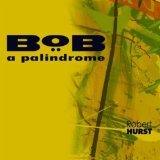
Robert Hurst
Bob: a Palindrome
Bebob Records NEW SEASON HIGHLIGHT ****
It’s not quite the heavy metal umlaut, more an upside down version of one as you can see on the sleeve above, but Bob: a Palindrome, is Robert Hurst’s latest on his own Bebob records, a stellar septet befitting the company the musician habitually keeps, as the bassist appeared just last year on Macca’s Grammy winning Kisses on the Bottom.
Branford Marsalis, who Hurst made his name with in the Columbia years, is also on this new septet album, the centrepiece of which is a ‘Middle Passage Suite’ the title referring to the Atlantic slave trade, with individual pieces reflecting survival, death, and the continuum. Robert Glasper plays piano and Rhodes, and it’s interesting to hear Glasper on someone else’s records as well as his own, especially following the success of Black Radio. In some way his playing here recalls the style of one of his earlier records, Canvas. Bennie Maupin, a fellow Detroiter of Hurst’s, makes his presence felt quite early on flute, and another Detroit jazz legend, trumpeter Marcus Belgrave, who taught Kenny Garrett among others, melds more than well with Marsalis, and Glasper knits in beautifully behind the front line playing Rhodes on ‘Picked From Nick’.
It’s good to hear Tain Watts playing again with Branford (the Marsalis quartet hasn’t been the same without Tain), and the great drummer also has a significant musical rapport with percussionist Adam Rudolph who chops up the rhythms just right.
Highlights? Well the opening of ‘Big Queen’ has a sinuous momentum that recalls the Messengers with that slightly ominous atmosphere that Watts and Rudolph do much to build and push along; and Branford burns on the third part of the ‘Middle Passage’ suite.
The suite, in keeping with the rest of the album composed and arranged by Hurst, is the most important part of the record, the 21 minutes of music containing a unifying chamber music dimension as well as a jazz one; and Rudolph and Watts in Part II unite the separate ‘sections’ of the septet and ably direct the converging musics. UK group Zed-U were one of the first to highlight the Middle Passage as a subject for jazz composition in recent years and Neil Charles’ work on that record stands up well to Hurst’s superlative work here.
Later in Bob: a Palindrome ‘Indiscreet in da Street’ has formidable energy, and that’s a hallmark of this excellent album available for now as an import only.
Finally, with or without the upside down umlaut, this record might win an award for the most number of ‘thank you’ acknowledgements. More than 100 individual entries are printed so Hurst is clearly a grateful person! But we as listeners should be even more thankful for this quite superb album that achieves so much and shows such indomitable spirit throughout. MB